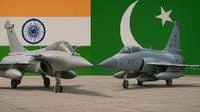On May 7, 2025, shares of China’s Chengdu Aircraft Corporation (CAC), the manufacturer behind the JF-17 Thunder and J-10C fighter jets, surged following a dramatic escalation in military tensions between Pakistan and India. The rise in stock prices came after the Pakistan Air Force (PAF) successfully downed multiple Indian military aircraft, including three Rafale jets, amid a backdrop of airstrikes that left 26 civilians dead and injured 46 others in Pakistan.
According to reports, the Indian Air Force launched airstrikes targeting six locations within Pakistan overnight, with some of the strikes hitting mosques. This prompted a swift and powerful military response from Pakistan. The PAF reportedly shot down five Indian aircraft and drones, including the aforementioned Rafales, a MiG-29, and a Sunhui surveillance aircraft. The immediate aftermath of these events saw CAC's stock jump by an impressive 18.18%, reflecting a surge of investor confidence in the performance of the Chinese-made jets utilized by the PAF.
In stark contrast, shares of Dassault Aviation, the French company responsible for manufacturing the Rafale jets, plummeted by 6% in the Varpi stock market. Analysts attributed this downturn to the reported losses suffered by the Indian Air Force’s Rafale fleet during the confrontation. The Rafale jets, celebrated for their advanced capabilities, are among the most sophisticated aircraft in the Indian Air Force’s arsenal, making their loss a significant blow to India's military reputation.
On Tuesday, May 6, Dassault Aviation’s shares fell sharply after Pakistan announced that its air force had shot down five Indian fighter jets, including three Rafales. Pakistani defense sources reported that the destroyed aircraft not only included the Rafales but also a MiG-29, a Su-30, and a surveillance drone. These aircraft had attempted to target Pakistani territories while remaining in Indian airspace, but the PAF successfully tracked and intercepted them.
Despite India's claims of having shot down Pakistani aircraft, Pakistani defense spokesmen dismissed these assertions as baseless and deceptive. One spokesman stated, "No aircraft of ours was downed, nor did we suffer any loss. This is just an attempt to deceive the Indian public to avoid mourning the death of the Rafale." The spokesman emphasized that the PAF had intercepted all Indian aircraft and safely returned all Pakistani planes.
The dramatic events surrounding the airstrikes and subsequent aerial engagements have not only affected stock prices but have also raised questions about the efficacy of India’s military strategy and the reliability of its advanced fighter jets. The outcome of the Rafale jets in this confrontation has been characterized as both a technical failure and a diplomatic embarrassment for India.
Chengdu Aircraft Corporation, a prominent player in the aerospace industry, designs and manufactures combat aircraft, including the J-10 and JF-17 fighter jets specifically for the Pakistan Air Force. Following the news of the PAF’s success, CAC shares at the Shenzhen Stock Exchange (SZSE) jumped by 11.85 points, indicating a strong market reaction. At 9:45 AM Pakistani time, CAC shares stood at CNY 71.08, up CNY 11.9 or 18 percent. By 11:45 AM PKT, the share price remained in the green at CNY 69.42, reflecting a 17.17 percent increase. This upward trend continued, with shares trading at CNY 68.88, up 16.29 percent or CNY 9.65 shortly thereafter.
Meanwhile, Dassault Aviation’s shares were not spared from the fallout. Reports indicated that they fell sharply by over 5 percent around the same time. By 11:53 AM PKT, shares were down by EUR 5.40 or 1.64 percent, trading at EUR 324. The swift decline in Dassault’s stock highlights the potential impact of military engagements on defense contractors and their market performance.
The airstrikes and subsequent military responses have reignited debates about the ongoing tensions between India and Pakistan, two nuclear-armed neighbors with a long history of conflict. The situation remains fluid, with both nations on high alert following the recent incidents. As the world watches, the implications of these military actions extend beyond immediate casualties, affecting diplomatic relations and international perceptions of military capability.
As the dust settles from this latest confrontation, analysts and military experts will undoubtedly scrutinize the effectiveness of the Rafale jets in combat scenarios and the overall readiness of the Indian Air Force. Meanwhile, investors will be keenly observing the stock market trends of both Chengdu Aircraft Corporation and Dassault Aviation as the geopolitical landscape continues to evolve.
In the wake of these developments, the international community is left to ponder the broader implications of such military engagements, particularly in an age where advanced technology plays a pivotal role in modern warfare. The situation serves as a stark reminder of the volatility in the region and the potential for rapid escalations that can have far-reaching consequences.
As military tensions simmer, both nations are likely to reassess their strategies and capabilities in light of recent events. The eyes of the world remain fixed on South Asia, where the balance of power is perpetually in flux, and the stakes have never been higher.




